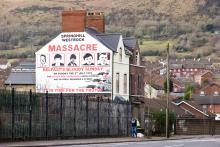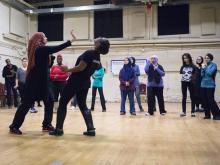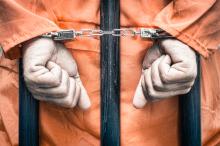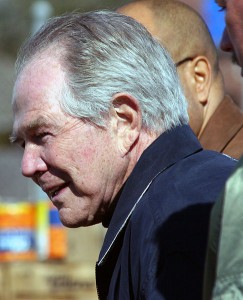terrorist

When our desire for security is so great that it diminishes our humanity and our capacity, or willingness, to see the world through the eyes of another, we lose a precious part of who we were designed to be. Our hearts are hardened, calcified.

Melissa Grajek was subjected to all kinds of taunts for wearing the hijab, but an incident at San Marcos’ (Calif.) Discovery Lake sealed the deal.
Her 1-year-old son was playing with another boy when an irate father saw her and whisked his son away, telling Grajek: “I can’t wait until Trump is president, because he’ll send you back to where you came from.”
The man then scooped up a handful of wood chips and threw them at Grajek’s son.

The Senate passed the annual military bill on Nov. 10 with an overwhelming 91-3 vote, reports The New York Times.
The measure includes provisions that prevent the transfer of Guantánamo detainees to the United States, effectively blocking any attempt to close the terrorist detention facility.

In the wake of the Boston Marathon bombings that left three dead and more than 260 injured, perhaps none face more significant adjustments or a longer road ahead than the 14 amputees who lost a limb.
For these victims, the path forward involves relearning almost everything, from getting out of bed to getting in a car. Whether they go on to lead satisfying lives depends largely on how they handle the spiritual challenges at hand, according to amputees and researchers.
Losing a limb is like losing a family member: It involves grief and mourning, according to Jack Richmond, a Chattanooga, Tenn., amputee who leads education efforts for the Manassas, Va.-based Amputee Coalition. When one’s body and abilities are radically changed, questions of meaning are suddenly urgent: Why did this happen? Why am I here?
“You’re wondering: Why did I live?” said Rose Bissonnette, an amputee and founder of the Lancaster, Mass.-based New England Amputee Association, a support organization for amputees.

I’m not offering this as consolation to those who have lost someone they love, but as a warning. What’s true of those we love may be just as true of those whom we hate and fear: we become like what we worship, and we worship what we cherish in our hearts.
When people commit monstrous deeds, it is hard not to turn and stare in horror. Think about how hard it is to pull your eyes from the television even when none of the news is new, just the same breathless commentary about what we don’t yet know, what we still don’t understand about the latest act of terror.
When the monsters and their violence become our focus, they grow and become our gods. We’ve become very good at hurting one another, so of course we need to be vigilant. But it’s possible to take our fear too far, to let our natural reaction to sudden violence become a permanent policy of suspicion and terror. Then we are in danger of worshiping our would-be enemies. We don’t worship them joyfully, but we worship them anyway, the way we might worship any vengeful, unstable, wrathful gods: looking over our shoulders and fearing their power. If the best we can come up with is invective against immigrants, suspicion of people unlike us, and perpetually heightened security measures, it starts to look like our hearts are full of fear.

The Boston Marathon bombing is so shocking because it was obviously done by someone(s) who wanted to prove something not to themselves, but to others. Could they display to the world his repressed rage enough? Could they divert attention to their cause enough? Could they maim and kill the innocent for some misguided agenda enough? That is what makes this act of terrorism so terrifying: a sick person or people trying to prove something to others by targeting those who are simply proving something to themselves, or trying to do something for others. It is jarring.
Ninety minutes before the bombs detonated, I was concluding a presentation on Jesus’ parable of the Good Samaritan. That recent immersion into Luke’s narrative shaped my video viewing of the bombing’s aftermath. The one who “fell into the hands of robbers” was everywhere. The assaulted and bloodied were scattered by the side of the road, in this case, Boylston Street. Instead of people passing by on the other side, however, it was quite the opposite. Spectators and emergency medical personnel waded into the grisly scene and treated the wounded with exquisite care.
Ridiculous. Ignorant. Racist. Dangerous.
These are just a few of the terms that flew out of the Middle East this weekend following Newt Gingrich’s unwelcome remarks about Israel and the Palestinians on Friday.
As the Republican front-runner, Gingrich was speaking to the cable TV Jewish Channel and hoping to curry favor with its conservative pro-Israel constituency.
What did he do? He described the Palestinians as an “invented people” and lumped every Palestinian under the terrorist umbrella. There is no difference between Hamas and the Palestinian Authority, he said.
On Saturday night during the ABC Republican debate, Gingrich doubled-down: “They [the Palestinians] are all terrorists.”
A few of the other candidates looked, well, alarmed.
Finally, as President Obama has announced, this American war will soon be over, with most of the 44,000 American troops still in Iraq coming home in time to be with their families for Christmas.
The initial feelings that rushed over me after hearing the White House announcement were of deep relief. But then they turned to deep sadness over the terrible cost of a war that was, from the beginning, wrong; intellectually, politically, strategically and, above all, morally wrong.
The War in Iraq was fundamentally a war of choice, and it was the wrong choice.
On the morning of September 11, 2001, I was at home in Washington, D.C. getting ready to go to Sojourners' office. I was upstairs listening to the news on NPR when I heard the first confusing report of a plane crashing into the south tower of the World Trade Center. I immediately called downstairs to Joy and asked her to turn on the television to see what was going on. Moments later, as we ate breakfast together with our three-year-old son Luke, we watched the second plane strike the north tower. I still remember my first response to Joy, "This is going to be bad, very bad," I said.
Of course, I meant more than just the damage to the Twin Towers and the lives lost, which became far greater than any of us imagined at first. Rather, my first and deepest concern was what something like this could do to our country and our nation's soul. I was afraid of how America would respond to a terrorist attack of this scope.
I just returned from a very moving convocation at the Claremont School of Theology where I am on the faculty. We were celebrating the historic founding of a new interreligious theological university that brings together institutions representing the three Abrahamic faiths, along with our newest partner, the Jains. The Jains are an eastern religion founded in India over 2,500 years ago who are perhaps best known for their deep commitment to the concept of no-harm or ahimsa.
While each partner institution will continue to train religious leaders in their own traditions, the Claremont Lincoln University will be a space where future religious leaders and scholars can learn from each other and collaboratively seek solutions to major global issues that no one single religion can solve alone. The CLU's founding vision of desegregating religion was reflected in the extraordinary religious diversity present at the convocation held in a standing room-only auditorium. I sat next to a Jewish cantor and a Muslim woman who had tears flowing down her face as we listened to the prayers offered in all four religions along with a reflection from a Humanist speaker.
On the morning of September 11, 2001, I was standing in the bathroom of my apartment outside Chicago, about to hop in the shower, when I heard the phone ring and then my husband call my name.
"It's Roger from the desk," he called, sleepily, invoking the name of the morning assignment editor at the Chicago Sun-Times where I was a reporter at the time.
I padded down the hallway in my pajamas to the living room and picked up the phone.
"How quickly can you get down here," Roger asked.
"I dunno, an hour, maybe," I said. "Why? What's up?"
"A plane hit the World Trade Center in New York," he said. "They think it's a terrorist attack."
This morning most Americans are feeling a sense of relief at the news that Osama bin Laden is dead.

